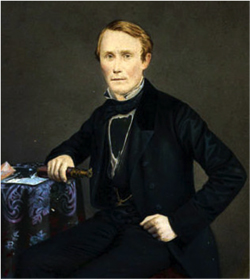E.M. Forster’s
ALEXANDRIA:
A HISTORY AND GUIDEThe Romance
of Tristan and Iseult
by Joseph Bédier
and Hilaire BelloIn The Fullness of Time
by Vincent NicolosiThe Journal of Marie Bashkirtseff:
I AM THE MOST INTERESTING BOOK OF
ALL & LUST FOR GLORY War in Nicaragua
by William WalkerABOUT FONTHILLCONTACT FONTHILL |
War in Nicaragua
 The Author The Author
William Walker (1824-1860)
He is without parallel in American history, a figure virtually forgotten in the vast, expansive territories to the north of the Rio Grande, but as notorious and well remembered to the south as any conquistador, marauder or murderer in a long history abounding with dictators and pirates, plunderers and thieves. Between the close of the Mexican War in 1848 and his execution on the vast and lonely beach of Trujillo, Honduras in 1860, William Walker’s popularity in the United States paralleled that of Kit Carson and Walker’s fellow Tennessean, Andrew Jackson. Today, in the early years of the 21st century, Carson’s and Jackson’s names still conjure recognition as 19th century doers and men of action: pathfinders and Indian fighters, soldiers and explorers intrepid in the relentless American expansion to the West; but likewise today even in William Walker’s native Tennessee, his name evokes little more than marginal recognition and consideration as a strange anomaly, a curious cipher and shape-shifter, a queer, black-clad Mars-like Napoleonic figure who ventured from Nashville during the age of Manifest Destiny and, eventually, with a ragtag band of adventurers and soldiers of fortune managed to set himself up as the soi-disant President of the Republics of Baja California and Sonora (Mexico), and then as the legal President of the Republic of Nicaragua. Had he not made the grievous error of enraging Cornelius Vanderbilt—at that time one of the wealthiest, most powerful private citizens on earth—then his tenure and territory may have been longer and more encompassing. Though now all but forgotten in his native United States, it is fair to say that in Nicaragua, Costa Rica, Honduras and other nations that waged an allied war against him, the name William Walker evokes an immediacy and resonance as sinister and, for them, more haunting and ubiquitous than that of Adolph Hitler.
He was, in the parlance of the day, a “filibuster”—a derisive designation that Walker found most contemptible, and certainly beneath his aspirations when matched with his high and overreaching goals of power and empire. Today of course we associate “filibuster” with a politician verbally inflating a point to prevent action, to usurp by means of heroic verbosity—a sort of coup attempt with all the force of hot air. In Walker’s day “filibuster” denoted something far different—a military adventurer engaged in a hostile expedition to a foreign country with which one’s own nation was at peace; in short, a perpetrator or participant in a private invasion. The word comes to English from filibustero, Spanish for “freebooter” or “pirate,” and from the 18th century French flibustier, and before that from the Dutch vrijbuiter: vrij (“free”) and buit (“booty”)—one who plunders freely without sanction—piracy; thus filibusters were, in a manner of speaking, throwbacks to the Vikings. All elements of the word, with the exception of heroic verbosity, apply to William Walker, who was just about as laconic as any man could possibly be without being aphonic. He was accustomed to sitting through an evening amidst a boisterous circle of his fellow freebooters without uttering a word, or touching a drop of the potent aguardiente, or letting so much as a fleeting smile flicker upon his delicate lips, his inscrutable features. His surviving portraits have something of a Mona Lisa ambiguity, a self-satisfied apartness, a melancholy, and the ghost of a hinted, absent smile. As a boy in Tennessee, he passed long hours reading Romantic poetry to his consumptive mother; he possessed a talent and an appreciation for languages, and very likely for the sound of words. Thus aside from resenting the meaning of the word “filibuster,” he may have resented its sound: a bit like “bluster”—but that point is conjecture. So too the speculation that he may have felt less indignant over a similar but more Romantic or splendid-sounding appellation, like “corsair” or “Viking.” Like the Vikings, he too was a raider seeking to conquer and colonize, to take over, a bit like that other William the Conquer, himself a descendant of Vikings. As for Walker, what he did not seek was plunder in the form of gold or luxuries or private wealth of any kind, beyond that which would fortify his power. Here and there one perceives (or imagines) faint religiosity—as in one, aware of Mark’s Gospel, who cares not for the deceitfulness of riches, nor for the lusts of other things entering in. To Walker’s credit is the fact that, when he was finally driven from Nicaragua, he was as poor—or poorer—than when he first arrived. His initiative was personal and militant, to establish a private empire; and his austerity, temperance and celibacy were that of a decorous, ascetic killer…
Excerpted from The Introduction “Considerations of William Walker: He Who Would Be Emperor” by Vincent Nicolosi
|



 The Author
The Author